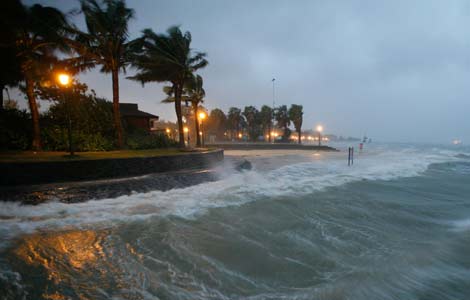Xinjiang offers rewards for tips
Updated: 2013-07-03 07:58
By Cui Jia in Shanshan, Xinjiang, and Cao Yin in Beijing (China Daily)
|
||||||||

50,000 to 100,000 yuan provided for information on terrorist activity
Legal professionals have stressed the importance of protection for informants, as police in the remote Xinjiang Uygur autonomous region call for more public reports of crimes or planned crimes.
The Xinjiang public security department issued a notice on Tuesday offering rewards of 50,000 ($8,155) yuan to 100,000 yuan for tips that help solve violent or terrorism cases.
It also released a wanted list of 11 suspects, encouraging residents to provide information. Three of those on the list are accused of making explosives in a case police broke in which a gang allegedly planned to attack government buildings and police on May 26.
Police revealed that another two on the wanted list are suspected of killing two security guards in Hotan as well as several workers in a construction site in June.
Police also called on the public to hand in any dangerous knives, explosives and propaganda materials on terrorism or violent crimes they may have. People who do so within 10 days will be exempt from punishment, but anyone with such weapons or materials after the 10 days will face severe punishment.
The notices came days after a deadly terrorist attack in Lukqun, a township in Turpan prefecture, Xinjiang, on June 26, in which 24 people were killed.
Li Li, deputy director of the information office of the Xinjiang police, said the notices are aimed at catching criminals with the help of the public.
"We hope more people will help us with information and leave terrorists no place to hide," she said. The authority offered similar high rewards in July 2009 after a violent incident in Urumqi.
While it is normal for police to encourage informants, it is important to protect informants, particularly in places where violent attacks are common.
"Tips and personal information have to be kept confidential, and informants' privacy is to some extent more important than the tips," said Han Yusheng, a criminal law professor at Renmin University of China in Beijing.
Police must make informants' safety a precondition in investigations, he said.
If someone is disturbed, threatened or injured after providing information, police must quickly find the culprits and punish them, while still protecting the informant's privacy, Han said.
Liu Tao, an associate professor specializing in criminal investigation at the People's Public Security University of China, said information gathering should be based on respect and protection for informants. "People will give tips only when they feel the channel is safe enough," he said. "Otherwise, it's hard to encourage people to share what they know. No one wants to risk their safety or life just for a reward."
The autonomous region's public security department said it has already arranged for police officers to investigate and verify tips received and will improve the safety of the methods to convey tips, such as telephone calls, letters and the Internet.
People who have information to share can dial 110, which the bureau assures is a secure line, according to Li, the deputy director of the authority.
Abudurehman Wupper, head of Lukqun township, said he has told villagers about the police notices and encouraged them to provide information.
"We've realized how serious the attacks are and we've increased our awareness of prevention," he said. "I've suggested villagers speak up with information."
(China Daily USA 07/03/2013 page4)

 Canada vigilant after terror plot
Canada vigilant after terror plot
 Beckhams' star power shines
Beckhams' star power shines
 Worried parents drive imported milk sales
Worried parents drive imported milk sales
 Rumbia subsides but still brings heavy rain
Rumbia subsides but still brings heavy rain
 Fire engulfed Arizona firefighters in seconds
Fire engulfed Arizona firefighters in seconds
 Yao Ming, McGrady team up for charity
Yao Ming, McGrady team up for charity
 Egypt's Mursi rebuffs army ultimatum
Egypt's Mursi rebuffs army ultimatum
 No quick end in sight for Beijing smog
No quick end in sight for Beijing smog
Most Viewed
Editor's Picks

|

|

|

|

|

|
Today's Top News
China warms to US-led trade pact
Venezuela eyed as Snowden's asylum
Credit crunch hits smaller firms
Apple will hike its app prices
US public high schools lure Chinese students
Chinese firm looks to take a bite out of Apple
Bad habits add $34b to annual cost of cancer
Expats develop taste for organic dairy
US Weekly

|

|






